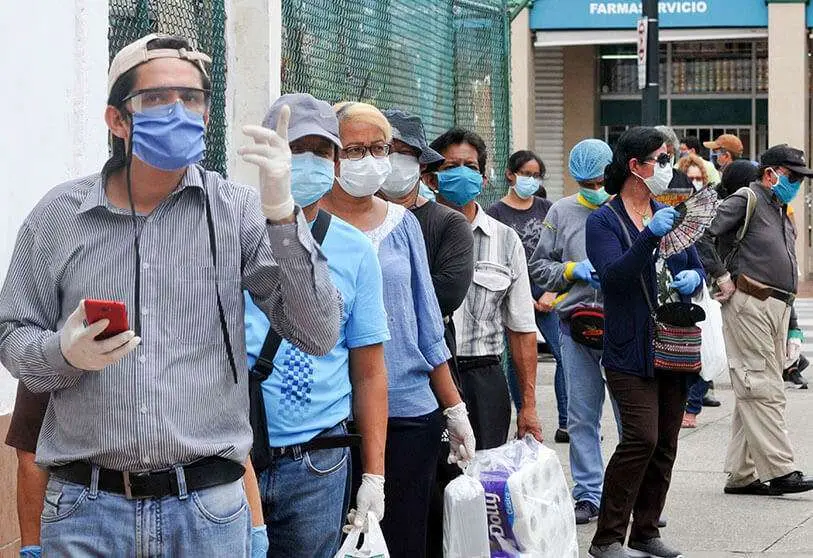America adds more countries with vaccines and Peru opens the door to corruption

Colombia and Venezuela joined the list of countries in the Americas that have already received their first doses of COVID-19 vaccines, while in Peru a corrupt distribution of vaccines to politicians has come to light, deepening distrust in its institutions.
With the arrival of batches from Pfizer and Russia's Sputnik V in the two countries respectively, the continent continues to gain ground on COVID-19 - albeit at uneven rates - at a time when the global outlook gives cause for optimism.
The World Health Organisation (WHO) said on Monday that global infections of COVID-19 have halved since the beginning of 2021, from five million in the first week of January to 2.6 million in the past seven days.
Despite the decline in cases, the world reached 109,067,558 cumulative infections on Monday and nearly 2.5 million deaths, according to the independent count by Johns Hopkins University.

In absolute numbers, the United States remains the hardest hit country in the world, with nearly 28 million infections and 486,106 deaths, followed in incidence by India, with some 11 million confirmed positives and around 155,000 deaths.
In terms of deaths from the disease, however, Brazil ranks second in the world, with 239,245 deaths, while the number of cases in the South American giant is 9,834,513 million.
In Latin America, Colombia has 2,195,039 positive cases, with 60,000 deaths, followed by Argentina (2,025,798), with some 50,000 deaths, and Mexico (very close to 2 million) with 175,000 deaths.
A first batch of 50,000 Pfizer vaccines, of the total of 61.5 million purchased by the Colombian government, arrived at Bogotá's El Dorado international airport, where the cargo was received by President Iván Duque and his health minister, Fernando Ruiz.
These first vaccines were manufactured in Belgium and their application will begin this week to frontline health workers in the fight against COVID-19.

In turn, Venezuela received its first doses on Saturday, with 100,000 vaccines from the Russian Sputnik V, on a plane from Moscow on the Venezuelan state airline Conviasa, as part of the contract established between Venezuela and Russia for ten million doses.
Like Colombia, the Caribbean country will begin immunising health workers, followed by teachers and then members of Somos Venezuela, a governmental movement that distributes aid and proselytises politically in the country.
The two nations thus join other American countries with immunisers such as Argentina, Bolivia, Brazil, Canada, Chile, Costa Rica, Ecuador, the United States, Mexico, Panama and Peru, with a late arrival that has cost the two governments criticism from the opposition.
In Latin America, Cuba, El Salvador, Guatemala, Honduras, Nicaragua, Paraguay, Uruguay, Dominican Republic and Haiti still do not have vaccines.
Citizens woke up this day in Peru with another reason for discontent with the government, after it came to light that former president Martin Vizcarra (2018-2020) and his wife secretly received "courtesy" vaccines from Sinopharm.
The scandal also implicates several high-ranking Peruvian officials, opening a new political crisis and raising deep doubts about the whole process of testing and approval of the vaccine in the country.
The inoculations took place in secret, between September and January, with doses of Sinopharm's study vaccine in the Andean country.

Mexico kicked off vaccination for the over-60s across the country, prioritising the poorest populations, in a reactivation of the immunisation plan prompted by the arrival of the first shipment from AstraZeneca, with long lines and some logistical hurdles.
"We have already started the vaccination plan from today and we are not going to stop it, we are going forward, to vaccinate all the people," celebrated the president, Andrés Manuel López Obrador, spurred on by the 870,000 AstraZeneca vaccines arriving from India and by the new shipments from Pfizer that will land this week.
As of Monday, 726,313 covid-19 vaccines had been administered across Mexico, all from Pfizer, and only 86,198 people had received the two injections needed for immunity.
In an example to other countries, nearly 2 million people have received at least one dose of the covid-19 vaccine in Chile, one of the highest rates per 100 population in the world and coming as the second wave appears to be stabilising.

Chile, which has already approved vaccines from Pfizer, AstraZeneca and Sinovac and is studying other injections, is the clear leader in vaccination in Latin America, administering 9.94 per 100 population, according to data as of 14 February from Oxford University's Our World in Data registry.
Rio de Janeiro, meanwhile, will temporarily suspend its immunisation campaign from Wednesday due to a lack of vaccines, announced the mayor of Brazil's second-largest city, Eduardo Paes.
The suspension of the vaccination campaign comes as Brazil faces a second wave of the most virulent pandemic and as the average number of deaths in the past 14 days remains above 1,050 a day for the seventh consecutive day, something that did not happen even at the peak of the first wave.
The beginning of the week and the arrival of new vaccinations left behind the forced displeasure of thousands of Latin Americans who were left without celebrating Carnival. Brazil, for the first time in 180 years, did not have its iconic festival, which was cancelled to prevent further spread of the virus. Bolivia, Argentina and Colombia followed, with virtual events.
While most defended the measures, Nicolás Maduro urged citizens to participate in parades during the carnival. According to the quarantine system established by the president, which consists of seven days of closure followed by seven days of partial relaxation, this week should be a week of restriction, but because of the carnival, the government has extended the opening until Wednesday, the 17th.









